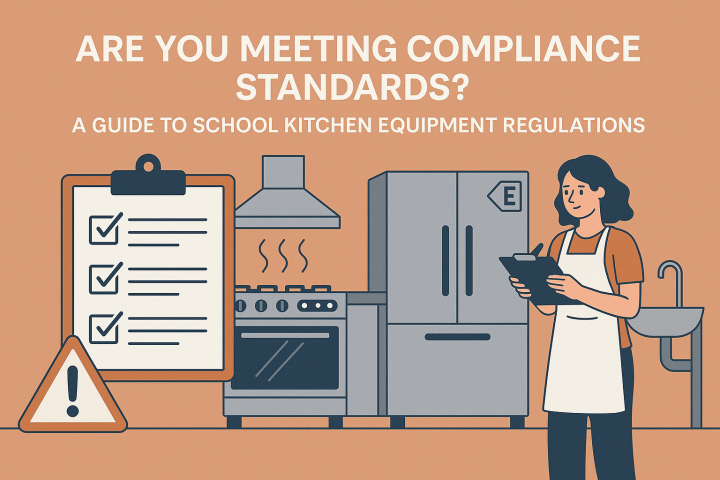School kitchens play a crucial role in providing students with nutritious meals daily. However, operating a school kitchen isn’t just about meal preparation; it also involves ensuring that kitchen equipment meets strict UK compliance standards. Schools must follow a range of legal and health regulations to ensure kitchen safety, efficiency, and hygiene.
Failure to comply with these regulations can lead to serious consequences, including fines, operational shutdowns, health hazards, and reputational damage. This guide will help you understand the key school kitchen equipment regulations, how to ensure compliance, and the best practices for maintaining a safe and efficient kitchen environment.

Why Compliance Matters in School Kitchens
Ensuring compliance with school kitchen equipment regulations is essential for:
- Health & Safety – Protecting students and staff from potential hazards.
- Legal Obligations – Avoiding fines and legal action from regulatory bodies.
- Operational Efficiency – Keeping kitchen equipment in top condition to avoid breakdowns.
- Cost Savings – Reducing the risk of emergency repairs and prolonging the lifespan of appliances.
Ignoring compliance standards can put lives at risk and create costly disruptions. Schools must take proactive steps to maintain high safety and hygiene levels in their kitchens.
Key UK Regulations for School Kitchen Equipment
- Food Safety and Hygiene Regulations
The Food Safety Act 1990 and the Food Hygiene Regulations 2006 set out the legal framework for food hygiene in school kitchens. Schools must ensure:
- Proper Food Storage – Refrigeration units must maintain the correct temperatures to prevent bacterial growth.
- Clean & Sanitised Equipment – Regular cleaning of kitchen surfaces and utensils to prevent cross-contamination.
- Pest Control Measures – Ensuring that kitchens are free from rodents and insects.
- Staff Training – Kitchen staff must complete food hygiene training to handle food safely.
Failure to comply with these regulations can lead to foodborne illnesses, inspection failures, and potential legal action.
- Gas Safety Regulations
Many school kitchens rely on gas-powered appliances, making gas safety a top priority. Compliance is regulated under:
- The Gas Safety (Installation and Use) Regulations 1998 – All gas equipment must be installed and maintained by a Gas Safe registered engineer.
- Annual Gas Safety Inspections – Schools must have annual checks to detect leaks and ventilation issues.
- Emergency Shut-Off Valves – Schools must have emergency gas shut-off controls in case of leaks.
A gas leak in a school kitchen can have serious consequences, including fire hazards and carbon monoxide poisoning, making compliance non-negotiable.
- Electrical Safety Regulations
Electric kitchen appliances in schools must comply with UK safety laws, including:
- The Electricity at Work Regulations 1989 – All electrical kitchen appliances must be regularly inspected to ensure they are safe to use.
- PAT Testing (Portable Appliance Testing) – Schools must carry out periodic PAT testing on electrical equipment to check for faults and prevent electrical fires.
- Wiring Inspections – Electrical wiring in school kitchens should be regularly tested and maintained.
Electrical faults are a leading cause of kitchen fires, making regular inspections essential for safety and compliance.
- Fire Safety Compliance
School kitchens must adhere to strict fire safety regulations under the Regulatory Reform (Fire Safety) Order 2005. Key compliance measures include:
- Fire Suppression Systems – School kitchens must have fire extinguishers, fire blankets, and automatic fire suppression units installed.
- Ventilation & Extractor Fans – Proper ventilation reduces grease buildup and lowers fire risks.
- Staff Fire Safety Training – Kitchen staff must be trained in fire prevention and emergency response.
A fire in a school kitchen can be devastating, so regular fire safety checks and equipment maintenance are vital.
- Waste Disposal & Environmental Compliance
School kitchens generate a significant amount of waste, including food scraps, grease, and packaging materials. Schools must comply with:
- The Environmental Protection Act 1990 – Ensuring proper disposal of food waste, cleaning chemicals, and packaging.
- Fats, Oils & Grease (FOG) Disposal Regulations – Grease traps must be installed and regularly maintained to prevent drain blockages.
- Energy Efficiency Standards – Schools are encouraged to use energy-efficient kitchen equipment to lower costs and reduce environmental impact.
Failing to properly manage kitchen waste can lead to environmental fines and costly plumbing issues.
How to Ensure Compliance in Your School Kitchen
- Schedule Regular Equipment Maintenance
- Arrange annual servicing for gas and electrical equipment.
- Ensure ventilation systems and grease traps are cleaned regularly.
- Keep Records of Compliance Checks
- Maintain detailed logs of safety inspections, servicing, and PAT testing.
- Document food safety training records for staff.
- Conduct Routine Safety Inspections
- Perform daily checks on kitchen equipment.
- Train kitchen staff to identify and report safety concerns.
- Invest in Energy-Efficient Equipment
- Upgrade to Energy Star-rated appliances to lower electricity and gas costs.
- Use LED lighting and automatic shut-off systems to conserve energy.
- Hire Qualified Professionals
- Only use Gas Safe registered engineers for gas inspections.
- Ensure certified electricians conduct PAT testing and wiring inspections.
- Train Staff on Compliance & Safety Procedures
- Provide regular training sessions on food hygiene, fire safety, and equipment maintenance.
- Display emergency procedures in clear, visible locations.
By following these steps, schools can prevent compliance breaches and maintain a safe, efficient kitchen environment.
Meeting school kitchen compliance standards is essential for protecting students, staff, and the wider school community. From food safety laws and gas regulations to fire prevention and waste disposal, schools must stay up to date with UK kitchen regulations to ensure smooth operations and avoid costly penalties.
By implementing regular maintenance schedules, staff training programmes, and compliance checks, schools can keep their kitchens running safely and efficiently. Staying ahead of compliance regulations not only protects students but also ensures that school catering services operate to the highest standards.
Is your school kitchen fully compliant? If you need professional servicing and maintenance to meet UK regulations, contact DCE today to schedule a compliance check and keep your kitchen in top condition.